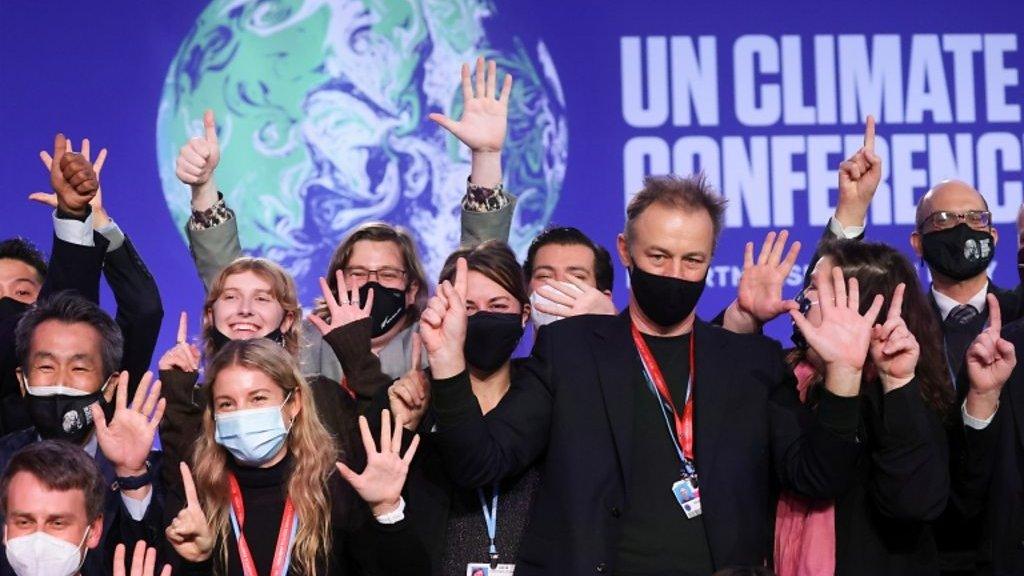COP26: China and India must explain themselves, says Sharma
- Published
Sharma: China and India will have to explain actions to climate-vulnerable countries
China and India will have to explain themselves to climate-vulnerable nations, COP26 President Alok Sharma has said as the summit ends.
It comes after the two nations pushed for the language on coal to change from "phase out" to "phase down" in the deal agreed in Glasgow.
But Mr Sharma insisted the "historic" deal "keeps 1.5C within reach".
It is the first ever climate deal that plans explicitly to reduce coal - the worst fossil fuel for greenhouse gases.
The summit, which was initially due to end on Friday, had to go into overtime before a deal was agreed late on Saturday - following the late intervention from India to water down the language on coal.
Later on Sunday, Prime Minister Boris Johnson will join Mr Sharma to give a Downing Street news conference on the outcome of the climate summit.
Mr Sharma said the deal struck in the Glasgow climate pact was a "fragile win" and urged China and India to "justify" their actions to nations that are more vulnerable to the effects of global warming.
He told BBC One's Andrew Marr Show: "I am going to be calling on everyone to do more.
"But as I said, in relation to what happened yesterday, China and India will have to explain themselves and what they did to the most climate-vulnerable countries in the world."
Mr Sharma, who had to hold back tears as he closed the summit following the late intervention, added: "I wouldn't describe what we did yesterday as a failure - it is a historic achievement."


China teaming up with India to water down the language will have come as something of a blow to those who wanted a much more ambitious outcome at the conference.
However - perhaps they should not be too pessimistic about the final agreement.
For example, here in Beijing the Communist Party's media mouthpiece Xinhua wire service is already stressing in its commentaries that coal is "the dominant source of carbon dioxide emissions in the process of electricity generation".
It may sound like that is just stating the obvious - but such wording from Xinhua represents a transmission of the party line across the country: coal is the biggest part of the problem!
Beijing knows that ultimately the writing is on the wall for coal, but it's the speed of its phase out which matters to the Chinese government.
It believes that the most developed countries got the world into this problem in the first place - enriching themselves along the way - so now argues that countries like China need to be cut more slack to catch up.
What's also being stressed here from the Chinese delegation has been the perceived shortfall from advanced countries to deliver on their promises to provide finance and technological support for developing countries to help them move to cleaner energy.
Vice Minister Zhao Yingmin, who headed China's team in Glasgow, said he hoped developed countries could "make further efforts to honour their commitments, enhancing support for developing countries, instead of merely urging other parties to raise their ambitions".

One of the main goals set out by COP26 was to ensure we do not go above 1.5C by 2100 - which scientists have said would limit the worst impacts of climate change.
As part of the agreement struck in Glasgow, countries will meet next year to pledge further major carbon cuts with the aim of reaching the 1.5C goal. Current pledges, if fulfilled, will only limit global warming to about 2.4C.
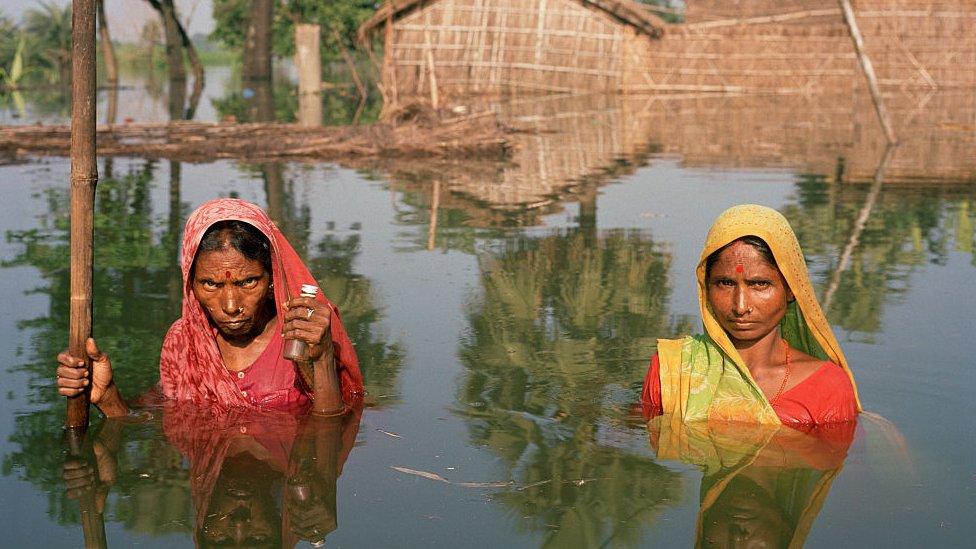
Extreme weather events such as flooding and wild fires are already experienced by millions around the world
Scientists have warned if global temperatures rise by more than 1.5C the Earth is likely to experience severe effects such as millions more people being exposed to extreme heat., external The world is currently 1.2C warmer than it was in the 19th Century.
Under the Glasgow climate pact:
Countries were asked to republish their climate action plans by the end of next year, with more ambitious emissions reduction targets for 2030
There is an emphasis on the need for developed countries to increase the money they give to those already suffering the effects of climate change - beyond the current $100bn annual target
The language about coal has been included for the first time ever in a global climate deal
A pledge in a previous draft to "phase out" coal was instead watered down to a commitment to "phase down" coal
The final deal agreed on has been met with some criticism.
Ed Miliband, shadow business and energy secretary, told the Sky News' Trevor Phillips programme that "keeping 1.5 degrees alive is frankly in intensive care".
He said the world's task was to halve global emissions by 2030 and said that despite some progress in Glasgow "the world is only probably about 20% or 25% of the way to that goal".
But Mr Miliband commended Mr Sharma on his efforts.
Allow X content?
This article contains content provided by X. We ask for your permission before anything is loaded, as they may be using cookies and other technologies. You may want to read X’s cookie policy, external and privacy policy, external before accepting. To view this content choose ‘accept and continue’.
The UN's climate change chief, Patricia Espinosa, described the mention of coal and fossil fuels as a "huge step forward".
But she added that "we need to also balance out the social consequences for so many people around the world, especially in the poor countries".
Lord Deben, the chairman of the Climate Change Committee, told BBC Radio 4's The World This Weekend that the UK should negotiate future trade deals with "some congruence with the world battle on climate change" - pointing to Australia as an example.
"I hope our government will also recognise that you really cannot sign trade deals on the basis that Australia can do nothing to insist on their farmers meeting the challenge of climate change and then export their goods to Britain," he said.
He added that India's push to change the language on coal was a "misuse" of the process.
A report by the Climate Action Tracker group has calculated that at the current rate, the world is heading for 2.4C of warming by 2100.
If no action was taken, scientists believe global warming could exceed 4C in the future. This could lead to devastating heatwaves, droughts, extreme rainfall and floods. As a result, millions of people could lose their homes to rising sea levels.
In addition to this, the change in climate could lead to irreversible damage to our ecosystem - with the mass extinction of animal and plant species.


Climate stripes visualisation courtesy of Prof Ed Hawkins and University of Reading.
Related topics
- Published14 November 2021
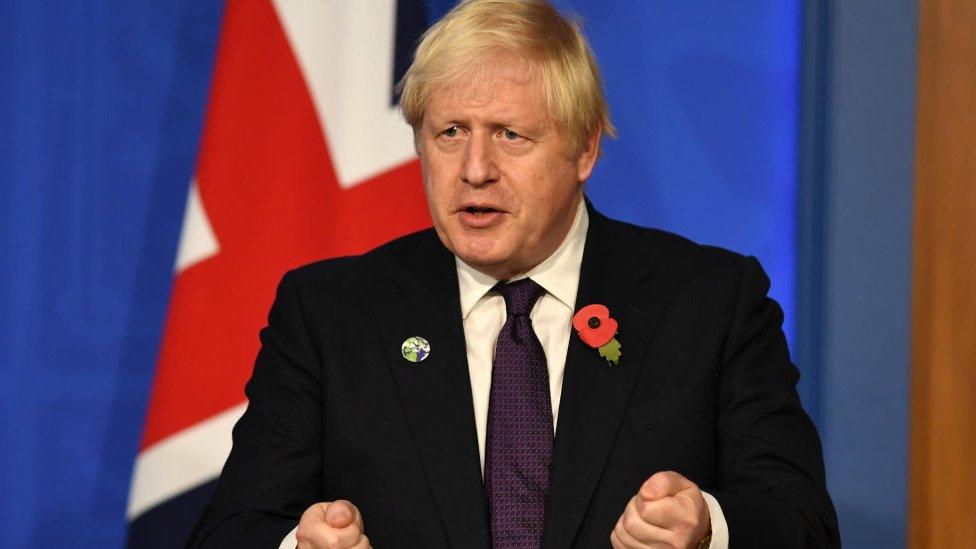
- Published14 November 2021
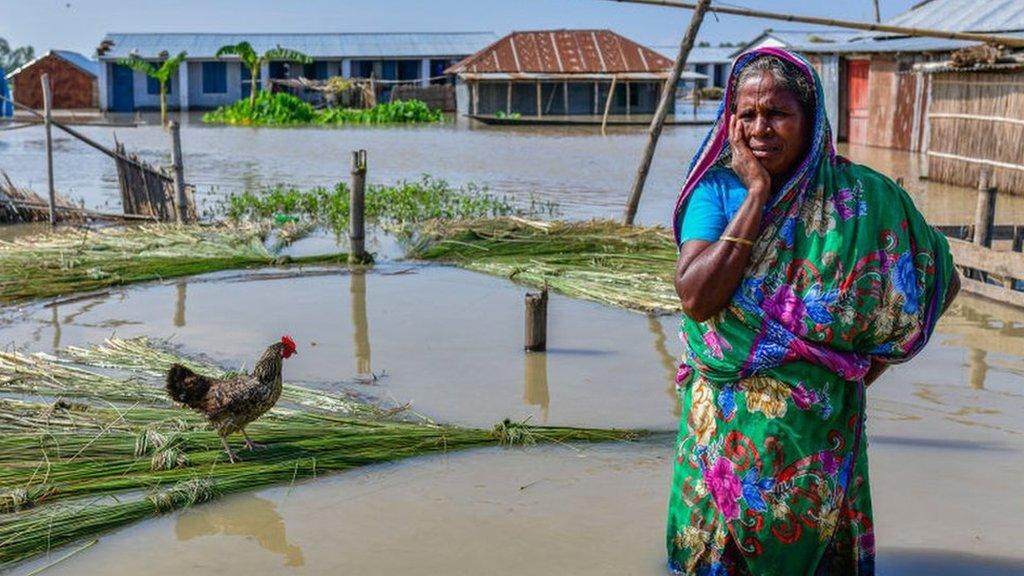
- Published15 November 2021
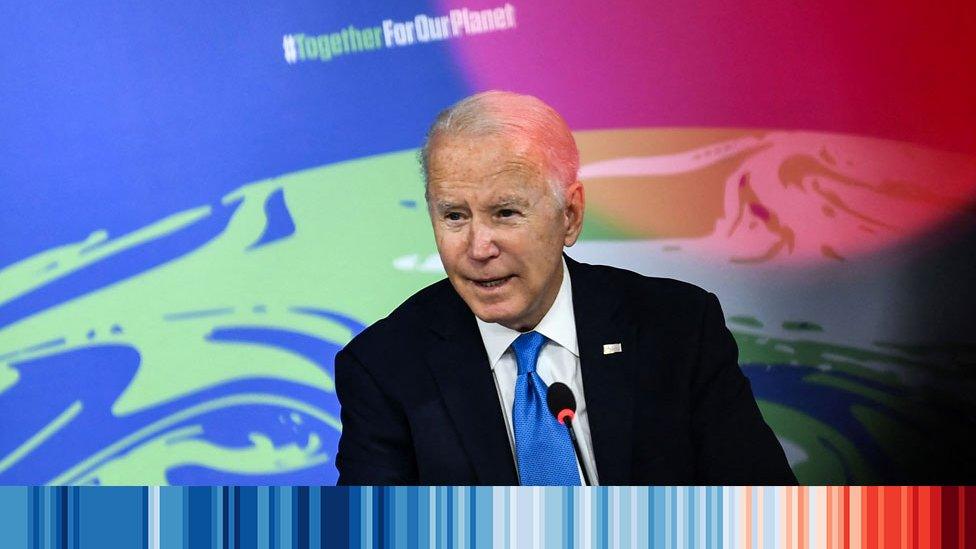
- Published14 November 2021
